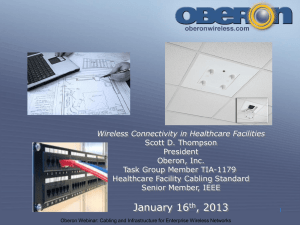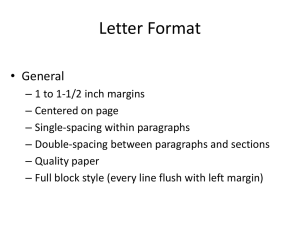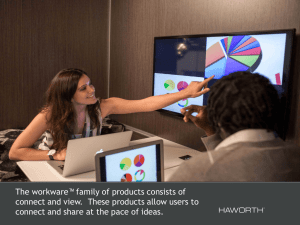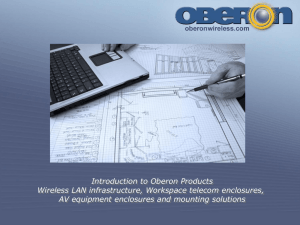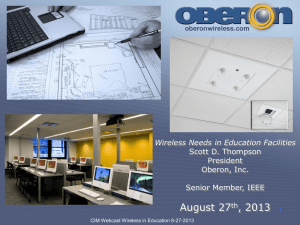Presentation: Wireless in Hospitals Bootcamp
advertisement
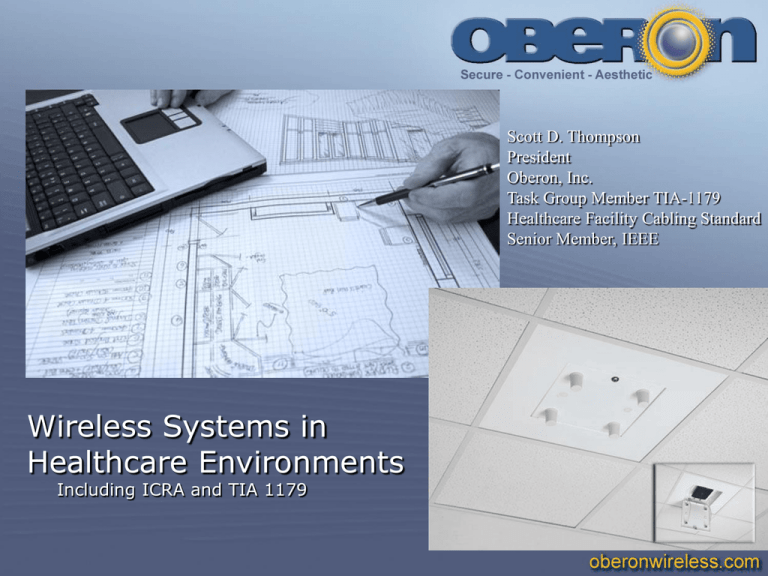
Scott D. Thompson President Oberon, Inc. Task Group Member TIA-1179 Healthcare Facility Cabling Standard Senior Member, IEEE Wireless Systems in Healthcare Environments Including ICRA and TIA 1179 Oberon’s Mission: Oberon is the preferred source for wireless LAN access point enclosures, installation and mounting solutions, antennas, and workspace telecom enclosures for cost effective, secure, code compliant, aesthetic enterprise Wi-Fi deployments. Oberon's products are designed by experts with exceptional in-the-field, wireless LAN industry experience. Oberon has formalized agreements with the following manufacturers for engineered enclosure and mounting solutions for wireless networks: We manufacture ceiling and wall mounted Telecommunications Enclosures (TEs) for wireless LAN access points and other networking components Wireless AP enclosure Workspace Telecom Enclosures Agenda How are (Wi-Fi, DAS) endpoints (Access points, Remotes) installed? Infection control requirements (ICR) in Hospitals Code Compliance: Working in the “plenum” space TIA-1179 and wireless networks Reliable performance mandates Aesthetics Who to sell to Healthcare Wi-Fi and DAS - Hospitals were “early adopters” of wireless networking - In hospitals, wireless networking is mission critical, serving point of care (bedside) applications, mobile workstations on carts (COWS), EHR, mobile asset tracking, RFID, telemetry, voice, etc. - Hospitals have special requirements that are becoming more widely adopted: o o o o o Infection Control Risk Assessment (ICRA) Strict adherence to codes and standards (NEC and TIA) Physical Security Preservation of the design for mandated performance Aesthetics Installing Wireless LAN Access Points (APs) and Cellular in-building wireless (or DAS) remote units (herein referred to as “APs” • Method 1: AP above the ceiling • Method 2: AP attached to ceiling grid • Method 3: AP in a ceiling enclosure or locking mount • Method 4: AP on the wall Preferred installation orientation for best coverage AP above ceiling AP in enclosure AP on the ceiling grid AP on the wall Method 1: AP above the ceiling- things to avoid Cracked ceiling tile A lot of metal “Poke thru” antenna Method 1: AP above the ceiling • Use a hanger sturdy enough for AP, use a support wire • Equipment should be UL 2043 “Plenum rated” Support Wire Oberon P/N 1045-00 above-ceiling hanger Method 2: AP on the Ceiling Grid • • • • Avoid lifting ceiling tile Minimize hole in tile Conceal cable Lock AP Infection Control Risk Assessment (ICRA) In Healthcare, the Joint Commission on Hospital Accreditation requires that hospitals establish procedures for mitigating the spread of infectious disease and contaminants- limiting access to the space above suspended ceilings (where dust has accumulated) Infection control risk assessment (ICRA) could have a serious impact on the times and conditions for cabling installation, moves, adds and changes, particularly in the air-handling “plenum” space, above suspended ceilings, or walls Breaches in the ceiling system should be avoided Contractors performing work in violation of ICRA procedures will be precluded from future bidding Infection Control Requirements (ICR) Lifting or removing ceiling tiles requires the installer to: Use Negative Air Pressure Enclosure (NAPE), or “tent off” the work area Use a HEPA air filter OR Method 3: Install AP in a ceiling enclosure or locking mount to simplify ICRA procedure compliance Oberon model 1052 With ZDUAL antennas on door Method 3: Install AP in a ceiling enclosure or locking mount to simplify ICRA procedure compliance Oberon model 1059 ICRA in Healthcare Method 3: Install AP in a ceiling enclosure or locking mount to simplify ICRA procedure compliance Oberon 1052-CCOANT Antennas on door Oberon 1052-CCOAP AP in the Door Code Compliance - Hospitals are strict adherents to building safety codes and telecommunications standards -Many Authorities Having Jurisdiction (AHJs) will require strict NEC compliance and UL listing of installed components -Burn ratings of ceiling systems must be retained - Oberon’s enclosures are designed to satisfy National Electric Code (NEC) paragraphs 300.22 and 300.23 for installation in the air-handling (plenum) space - All of Oberon’s ceiling enclosure products are UL listed N.E.C COMPLIANCE - Article 300.22(C)(3) “Electrical equipment with a metal enclosure, or electrical equipment with a nonmetallic enclosure listed for use within an air-handling space……. shall be permitted to be installed in such other space unless prohibited elsewhere in this Code”. - Article 300.23 “cables, race-ways and equipment installed behind panels, including suspended ceiling tiles, shall be arranged and secured so as to allow removal of panels and access to the equipment.” Method 3: Install AP in a ceiling enclosure or locking mount to ensure code compliance Oberon model 1028 w ZDUAL Antennas Code Compliance TIA-1179 Healthcare Facility Telecommunications Cabling Standard Recognizes that “adding or changing horizontal cabling may cause disruption to occupants and their work once the buildings ceiling and walls are closed” Adding or changing horizontal cabling could result in a net decrease in care being provide, jeopardizing infection control measures…. Advocates use of enclosed pathways in air-handling spaces to avoid disruption of operations Advocates planning well ahead in cabling design and capacity Telecommunications enclosures (TEs) are an option in areas subject to infection control measures TRs and TEs should incorporate additional security measures to restrict access (Workgroup switches and APs) TIA-1179 Healthcare Facility Telecommunications Cabling Standard • Recognizing that many healthcare installations make use of a number of wireless applications, “It is recommended that the wireless environment be characterized and understood prior to the design, choice, and installation of cabling to ensure satisfactory operation” • Telecommunications Industry Association TIA 569-B – accepts use of telecommunications enclosures in the ceiling space to secure wireless access points and other networking appliances, and advocates protecting infrastructure Method 3: Install AP in a ceiling enclosure or locking mount for standards compliance and best practice Oberon 1072-00 DAS, Wi-Fi AP and Switch in Enclosure Physical Security and Reliable Performance Mandates • Some jurisdictions have enacted ordinances that include provisions for radio coverage of public safety signals within the building as a condition of occupancy • Includes signal level and reliability Grapevine, TX - Ord. No. 109.2 , Min signal -107 dBm, 95 % of each floor 800 MHz band, Adjacent band filtering, 8 hour battery backup • Suggests requirement to “lock down” the wireless infrastructure • Furthermore, protection of confidential patient information (HIPAA), suggests access points should be physically secured Method 3: Install AP in a ceiling enclosure or locking mount for physical security and reliable performance mandates Oberon model 1030 w/ ceiling flange Improve RF coverage and preserve the site survey Method 3: Install AP in a ceiling enclosure or locking mount for physical security and reliable performance mandates Oberon model 1052 with ZDUAL antennas Physical Protection of AP and Antennas Method 4: Install AP on wall enclosure or locking mount for physical security and reliable performance mandates Oberon model 1022 w ZDUAL Antennas Prevent obstruction or tampering Method 4: Install AP on wall enclosure or locking mount for physical security and reliable performance mandates Oberon 1032-C Locking Case Oberon 1029-00 Right Angle Wall Bracket Method 4: Install AP on wall enclosure or locking mount for physical security and reliable performance mandates When using NEMA boxes outside: • Avoid direct sun • Avoid Metal NEMA Enclosures • Consider thermal rise. See Oberon application note at http://www.oberonwireless.com/WebDocs/App_Note_Calculating_temperature_rise_in_Enclosures.pdf Aesthetics Unlike most data com infrastructure products, the wireless access point or antenna is highly visible Many hospitals have aesthetics committees Architects may specify color and style Custom styles and colors are available Method 3: Install AP in a ceiling enclosure or locking mount for aesthetic, professional installation Oberon model 1053 with Cisco antennas Aesthetics and Convenience Method 3: Install AP in a ceiling enclosure or locking mount for aesthetic, professional installation Oberon model 1064 w Cisco 1140 AP Architectural style match Simplify Moves, Adds, Changes, and technology upgrades Terminate cable at the enclosure, test and verify cabling at that point Un-necessary to lift ceiling tile to service access points Methods to easily migrate to new vendors and technologies Method 3: Install AP in a ceiling enclosure or locking mount to simplify moves, adds, changes, and technology upgrades Oberon model 38-1052-ADPDOOR-AP105 Interchangeable doors permit simple upgrades to completely different access points Method 3: Install AP in a ceiling enclosure or locking mount to simplify moves, adds, changes, and technology upgrades Oberon 1068-00 Oberon 1068-00 with Cisco AP Oberon 1068-00 with Aruba Networks AP Oberon 1068-00 with Ruckus AP Universal locking ceiling mount Who to sell to Telecom/datacom infrastructure- cabling and wireless personnel Plant Services or Facilities Personnel Infection prevention and control coordinator or Infection Preventionist- in Quality Control or Patient Services Department Public safety/in-building comm coordinator Bio-Medical personnel Other verticals where Oberon wireless enclosures may be required: -Healthcare- Many hospitals have Infection Control Risk Assessment (ICRA) procedures. These procedures mitigate access to the space above ceiling tiles to restrict the spread of infectious diseases. - Retail – The Payment Card Industry Data Security Standard (PCI-DSS) requirement 9.1.3 states that the operator must “Restrict physical access to wireless access points, gateways, and handheld devices” - Government – Directive 8100.2 mandates FIPS 140-2 compliance wherein FIPS 140-2 paragraph 4.5 requires “physical security mechanisms” to be applied - Certain Municipalities - Some jurisdictions have enacted ordinances that include provisions for radio coverage of public safety signals within the building as a condition of occupancy - Education- Wireless is mission critical, mass notification systems must be reliable Why use Oberon AP Enclosures in Healthcare? - Simplify ICRA procedure compliance when installing and servicing wireless access points - Clear-cut National Electric Code (N.E.C.) compliance - Physical security - Protect the integrity of the RF coverage design - Verify cabling to the enclosure prior to AP install - Simplified Moves, Adds, and Changes (MACs) - Clean, professional, aesthetic installation See the wireless AP mounting solution finder at: www.oberonwireless.com
